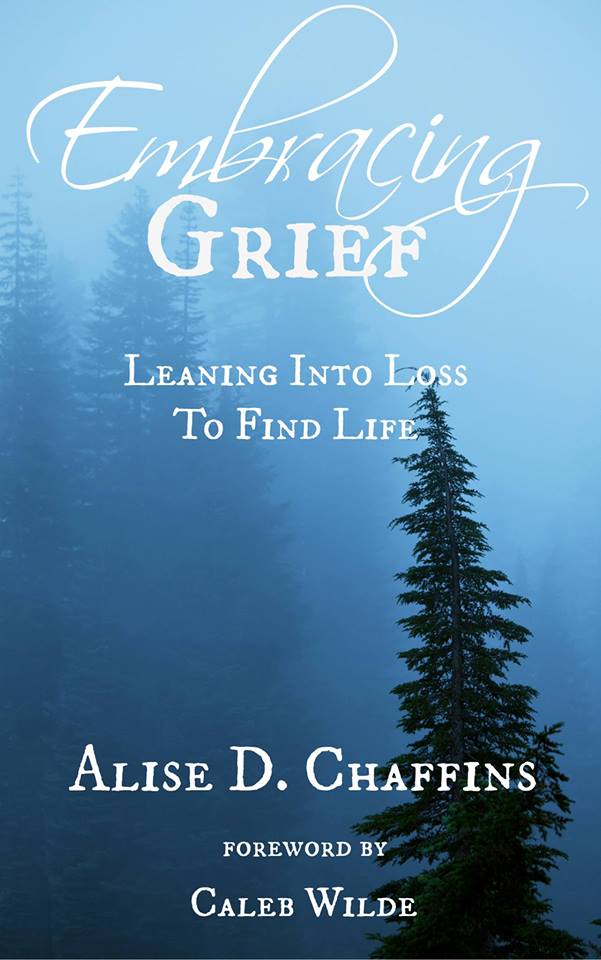Today’s guest is a blogger, author, musician and a woman who suffered a string of terrible events and decided to tackle the topic of grief to help others through the process.

If you’ve suffered a loss or know someone who’s grieving, this book will bring some needed comfort and give you helpful information to help better. Alise and I have an important conversation today. Please scroll down to the shownotes to access the important links mentioned in the show.
Podcast: Play in new window | Download (54.4MB) | Embed
Subscribe to Spark My Muse Apple Podcasts | Spotify | Email | TuneIn | RSS | Subscribe to Spark My Muse
Visit ALISE CHAFFINS‘ website.
Her book on grief.
Shownotes
Min 2:00
What is a good first step when someone is suffering?
MIN 3:00
“I’m sorry you’re going through this.”
Saying less is more.
Really listen to the language the person is using and echo it back to them and not the language that is comfortable for (you).
MIN 5:20
Using faith or heaven language might not be welcome.
MIN 9:30
About the string of suffering and trauma that brought grief to Alise and how she needed to get better through therapy and medication.
MIN 14:00
Medication during grief to process properly.
MIN 17:00
Isolation in grief. The paradox of uniqueness and universality of grief.
MIN 20:00
How we can share our grief with memories or with others in some way.
MIN 21:20
Grief Share organization and places to develop new rituals and finding community of other bereaved.
MIN 23:00
“Grief helps us find our humanity.”
Grief pulls us together. It’s the event that strips us of our humanity.
MIN 25:00
Attaching morality onto emotion is doing ourselves a disservice because it doesn’t allow us to feel what we feel. The actions beyond those feelings can be moral or immoral.
MIN 26:00
Grief and separation anxiety:
Grief is the (normal) human emotional response to loss. It is a common part of human experience and may produce growth. We can lose people, places, objects, relationships, and even ideas. Some losses may not be actual, but anticipated, or a perceived loss. (25) Acute grief looks remarkably similar to a classic anxiety attack (same physical symptoms). It is similar to the feelings felt in fear. In grief one fears the loss of self through separation, and experiences separation anxiety. (28)
It is a function of attachment. It can be understood also as our emotions catching up with our reality. (38) The more we can love the more we can grieve. Our abnormal attachments show up (caused by an improper process of grieving) as permanent emotional detachment or heightened attachment. (30)
R. Scott Sullender, “Grief and Growth: Pastoral Resources for Emotional and Spiritual Growth” Paulist Press, 1985.
MIN 28:30
Stages of grief like a water cycle and forgiveness and grace.
MIN 31:30
Extending forgiveness during grief and the risk and humility needed.
MIN 32:15
Healing and time and doing our part and letting go once we’ve done what we can.
MIN 33:15
A mustard seed of faith that the story isn’t over yet. Reconciliation can mean we put our weapons down and that’s restoration too.
MIN 34:15
Recognizing progress.
MIN 35:00
Being more aware of grief in others so that you can have more grace during trying circumstances.
MIN 37:00
FACEBOOK GROUP PAGE:
http://facebook.com/alisechaffins
Thank you for listening! If you enjoyed the show please leave a review that will be helpful to would-be listeners on iTunes and don’t forget to sign up for the newsletter!
New episodes come out on Wednesdays and Fridays!



